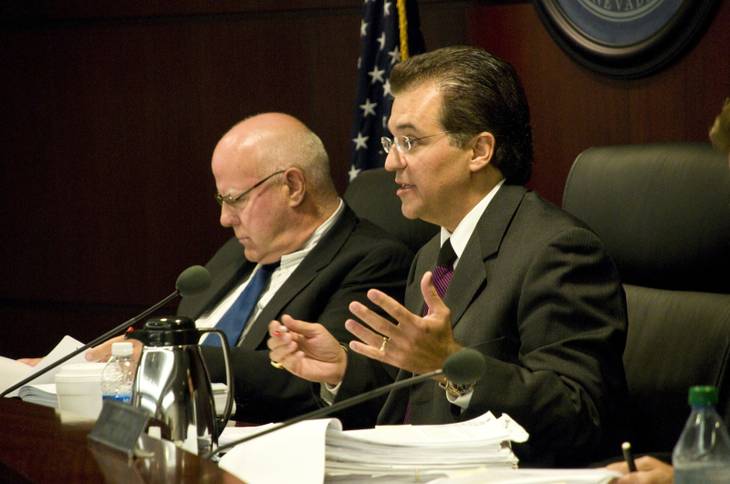The Nevada Gaming Commission on Thursday amended its regulation for licensing small casinos, placing more requirements on establishments like the Dotty’s chain.
The amended regulation will require slot parlors like Dotty’s to build new amenities within two years to maintain their licenses.
Dotty’s caters primarily to women who don’t like traditional bars and taverns.
Under terms of the revised Regulation 3.015, licensees will now be required to have a permanent bar with seating for at least nine customers, a contract or service agreement with a licensed liquor distributor and facilities to serve alcohol by the drink, and a restaurant of at least 2,000 square feet with seating for at least 20 customers. Establishments also must be open at least 12 hours a day, if the company wants to have more than four slot machines. With a restricted license for small operations, companies can have up to 15 slots.
Representatives of Dotty’s, the company that has been linked to the debate, haven’t indicated what their next move will be. When Clark County passed an ordinance listing similar requirements, the company filed a lawsuit.
Dotty’s chief operating officer, Michael Eide, estimated remodeling its 60 properties in the chain could cost the company $6 million.
Eide said rearranging plumbing, electricity and flooring and adding the required amenities would cost about $100,000 per location. Some Dotty’s locations don’t have kitchens and are not staffed for food service.
The final vote was 4-1 in favor of amending the regulation, with commission Chairman Peter Bernhard voting against the measure.
Thursday’s vote concluded several months of debates, public hearings and four drafts of the regulation, one each from Gaming Control Board Chairman Mark Lipparelli, the Nevada Resort Association, the Nevada Tavern Association and Commissioner Tony Alamo.
The two associations pressed for the regulatory change because they felt it was unfair for Dotty’s and several imitators to be licensed to have slot machines but not have to provide the types of amenities non-restricted licensees must offer.
Representatives of Dotty’s and similar establishments countered that the Gaming Commission has approved licenses using the Dotty’s business model for years and that it has only become an issue in the last couple of years because the model has taken customers away from struggling locals casinos hurt by the economy.
Some critics say the Resort Association is using the influence of big gaming establishments to slap down a new and innovative business model.
Dotty’s attorney Patti Becker told commissioners that Dotty’s has been in business since 1995, starting as an untested business model. Initially, the concept didn’t make any money, she said, but owners invested $60 million and built a chain of 50 locations.
Becker said her client was an example of how a company doesn’t have to have scantily clad women to sell a product. Becker also told the all-male commission that men view taverns differently than women, and the Dotty’s business model works because the 40- to 60-year-old women who play there don’t have to worry about being hit on by male customers.
Patrons want a laid-back, cozy atmosphere where they can meet with friends and play slot machines, she said. Dotty’s establishments are adorned with kitschy knick-knacks that its older players enjoy.
Becker showed commissioners enlarged photos of Dotty’s customers and bartenders and compared them with servers at other properties.
Eide said six of the company’s servers are in their 70s.
Becker also referenced Las Vegas Sun gaming reporter Liz Benston’s March 29 story about the Dotty’s environment and the company’s customers.
Representatives of the Resort Association, meanwhile, said they were satisfied with the regulatory changes approved by the commission, even though they weren’t as tough as they would have liked.
Attorney Sean Higgins for the Tavern Association and Todd Bice for the Resort Association said they wanted stricter amenity standards for restricted licensees to be fair to their respective members.
But Bernhard said one of his concerns was that the cost to licensees, particularly those in rural counties, would be so high that it would put those types of taverns out of business.
“We wanted to set up some bright lines to clarify these requirements,” Bice said.
“But those ‘bright lines’ could preclude operations in places like Esmeralda County,” Bernhard countered.
A provision in the revised regulation could solve that problem. Under the regulation, an applicant could seek a waiver from any requirement, and the state Gaming Control Board and the Gaming Commission could rule on waivers on an individual basis.
It could be several months before regulators start seeing any waiver requests.
Lipparelli said there could be as many as 40 license applications that would be affected by a new regulation.

